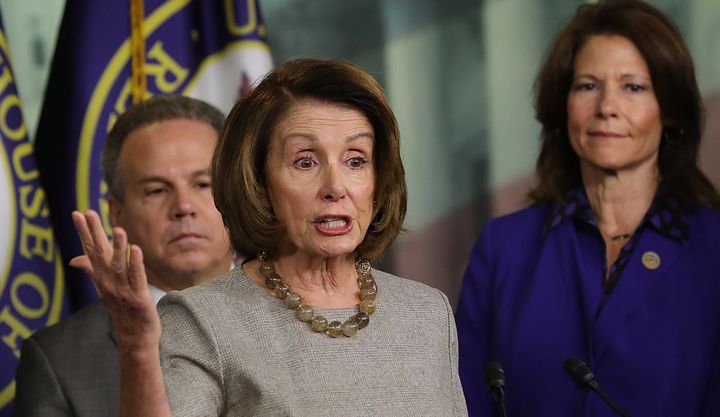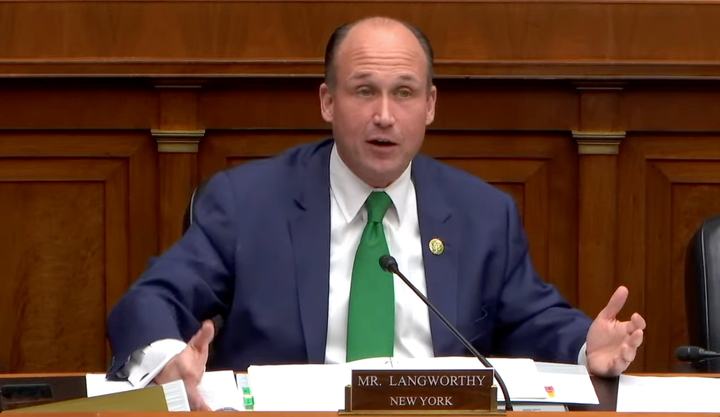The Democratic Congressional Campaign Committee (DCCC) is refusing to work with vendors that also work with candidates mounting primary challenges against incumbents, but it appears happy to hire vendors whose corporate clients work to block popular Democratic policies like net neutrality and Medicare for All.
The DCCC, the campaign arm of House Democrats, recently stated on its website that it “will not conduct business with, nor recommend to any of its targeted campaigns, any consultant that works with an opponent of a sitting Member of the House Democratic Caucus.” The new policy caused some Democratic candidates, including Marie Newman, who is mounting a primary challenge against anti-abortion Democratic Rep. Dan Lipinski in a solidly Democratic Illinois congressional district, to lose contracts with campaign consultants and strategists. In April, Newman told Politico that she had lost four vendors because of the policy.
As the DCCC forces its vendors to sever ties with progressives, it continues working with strategic consultants, polling firms, and marketing agencies whose clients are simultaneously lobbying against legislation that House Democrats ostensibly support.
“The DCCC is working against their own core mission by sidelining good consultants who want to both help flip red seats blue and help progressives in blue districts—and they are losing grassroots fundraising because of this unforced error,” said Marissa Barrow, spokesperson for Progressive Change Campaign Committee, an organization that has endorsed Democratic candidates running primaries from the left. “They hurt their mission even further by feeding the idea in the minds of swing voters or drop-off base voters that both parties are funded by the same corrupt special interests.”
The DCCC did not respond to Sludge’s questions about its vendor policies.
Consulting firm Vision Strategy and Insights has gotten $7,500 from the DCCC so far in the 2019 election cycle for strategic and political consulting services, and it scored nearly $6.6 million from the DCCC in the 2018 cycle. On its website, Vision Strategy and Insights’ client list includes multiple health care and pharmaceutical companies that are members of trade associations in the Partnership for America’s Health Care Future (PAHCF), a “dark money” group with a stated objective to “change the conversation around Medicare for All” and “minimize the potential for this option in health care from becoming part of a national political party’s platform in 2020.” The Vision Strategy and Insights clients affiliated with PAHCF include Pfizer, GlaxoSmithKline, and Johnson & Johnson.
One hundred and nine House Democrats—nearly half of the caucus—are sponsoring the latest Medicare for All bill, introduced by Rep. Primila Jayapal of Washington. Polling shows that the health care policy is supported by 83% of Democratic voters.
Vision Strategy and Insights also works with UnitedHealth Group, a health insurance company whose CEO said at a company meeting in February that the company has “done a lot more than you would think” to fight against Medicare for All. The company supports furthering the privatization of Medicare and it lobbied to repeal or delay the tax penalty for not having qualifying insurance that is at the heart of the Affordable Care Act. UnitedHealth’s PAC has given the majority of its campaign contributions to Republican politicians and political party groups in recent election cycles.
Other DCCC vendors work with cable and telecom companies that have spent hundreds of millions of dollars on lobbying to prevent the federal government from establishing net neutrality, an open-internet principle supported by 87% of Democratic voters. In March, scores of House Democrats introduced a bill that would restore net neutrality; now 198 of the 235 Democratic House members, including House Speaker Nancy Pelosi (D-Calif.) are sponsors, but DCCC Chair Cheri Bustos (D-Ill.) is not one of them. (Bustos voted in favor of the bill, and her communications director told Sludge that she meant to co-sponsor it but that did not happen due to “some wires being crossed.)
Marketing and communications agency Burrell Communications has not received a disbursement yet from the DCCC in the current cycle, but it was paid $490,000 by the DCCC in the 2018 cycle for media services and ad buys. The company says on its website that it also works with Comcast, the cable giant that has done more than any other company to kill net neutrality. In 2010, Comcast successfully sued the Federal Communications Commission (FCC) by arguing that the agency did not have legal authority to enforce its net neutrality rules. Since then Comcast has spent millions on lobbying the government to prevent the FCC or Congress from creating new net neutrality rules that could withstand a lawsuit like the one it brought in 2010. The company has also helped to fund a network of consumer groups and conservative organizations that work alongside it in its fight against net neutrality.
More anti-net neutrality telecom companies are clients of DCCC vendors. Polling firm GBA Strategies, which has received $62,500 from the DCCC in the current election cycle and received $1.7 million from the DCCC in 2017-18, works with Charter Communications, which issued a statement in support of FCC Chairman Ajit Pai’s reversal of a net neutrality order that was put in place in 2015 by the Obama administration. Polling firm Greenberg Quinlan Rosner Research, which has earned $32,000 from the DCCC so far this cycle, works with Verizon and Time Warner Cable, two broadband companies that have lobbied to kill net neutrality. Vision Strategy and Insights works with AT&T, which has lobbied against net neutrality and funded astroturf groups to kill net neutrality efforts at the state level.
Read more from Sludge’s Climate Desk
DCCC-approved consultants are also working with utilities and fossil fuel companies whose operations are furthering climate change, which House Democrats consider a crisis, having set up a Select Committee on the Climate Crisis early this year. SCRB Strategies (formerly SCN Strategies), which was paid $648,000 by the DCCC in 2017-18 for research and media work, earned $400,000 from utility giant Pacific Gas and Electric in 2018 to help the company argue that it should not be liable for wildfire damage linked to alleged mismanagement of its equipment. Pacific Gas and Electric generates power from a mix of renewable sources and coal, natural gas, and oil, and it is a member of the Edison Electric Institute, a trade association that was part of a campaign to halt the proliferation of rooftop solar panels.
Greenberg Quinlan Rosner Research works with BP, the oil and gas giant that lobbied the Trump administration to open up new coastal areas of the U.S. for offshore drilling and welcomed the administration’s decision to begin oil and gas leasing in the Arctic National Wildlife Refuge.
Law firm Perkins Coie has been paid at least $374,000 by the DCCC so far this cycle. In addition to providing the Democratic organization with legal services, Perkins Coie lobbies the government on behalf of oil and gas interests. The firm has earned $60,000 in 2019 from the Small Refinery Coalition Ad Hoc Committee to lobby the government on the Renewable Fuel Standard program. Perkins Coie petitioned the Environmental Protection Agency (EPA) in 2017 on behalf of the coalition for an exemption from the Renewable Fuel Standard’s ethanol blending requirements. Perkins Coie also lobbies for oil and gas companies Ergon and Philadelphia Energy Solutions.
As it works with firms that contract with companies opposed to Democratic policies, the DCCC enjoys hefty contributions bundled by lobbyists for some of the same companies or trade groups they’re part of, as Sludge has reported. Corporate lobbyists for businesses and groups such as BP America, the Pharmaceutical Research and Manufacturers of America (PhRMA), and NCTA—The Internet and Television Association—have delivered more than $1 million to the DCCC so far in 2019.
Jeff Hauser of the Revolving Door Project told Sludge that “the DCCC is acting like the Democratic Party is a sports team with a strict hierarchy, rather than an organic institution made up of people with largely shared values governed by internally democratic principles.”
“House Democrats have decided that second-guessing who gets to ‘start’ for the Democrats is worse than collaborating with the world’s worst corporate bad actors like BP, Comcast, and Pfizer,” Hauser said. “It’s hard to see how any self-described progressive could agree with that assessment.”
UPDATE: This article has been updated to note that Bustos voted in favor of the net neutrality bill and that, according to her office, she meant to co-sponsor the bill but some error in the process prevented that from happening.
Related:



